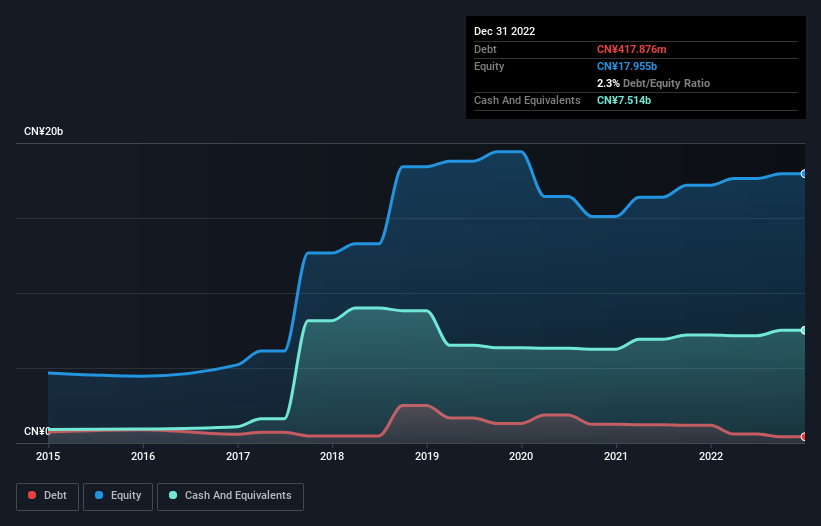These 4 Measures Indicate That China Literature (HKG:772) Is Using Debt Safely

Legendary fund manager Li Lu (who Charlie Munger backed) once said, 'The biggest investment risk is not the volatility of prices, but whether you will suffer a permanent loss of capital.' When we think about how risky a company is, we always like to look at its use of debt, since debt overload can lead to ruin. We can see that China Literature Limited (HKG:772) does use debt in its business. But the real question is whether this debt is making the company risky.
Why Does Debt Bring Risk?
Debt and other liabilities become risky for a business when it cannot easily fulfill those obligations, either with free cash flow or by raising capital at an attractive price. Ultimately, if the company can't fulfill its legal obligations to repay debt, shareholders could walk away with nothing. However, a more common (but still painful) scenario is that it has to raise new equity capital at a low price, thus permanently diluting shareholders. Of course, plenty of companies use debt to fund growth, without any negative consequences. The first thing to do when considering how much debt a business uses is to look at its cash and debt together.
Check out our latest analysis for China Literature
What Is China Literature's Net Debt?
You can click the graphic below for the historical numbers, but it shows that China Literature had CN¥417.9m of debt in December 2022, down from CN¥1.18b, one year before. But on the other hand it also has CN¥7.51b in cash, leading to a CN¥7.10b net cash position.

A Look At China Literature's Liabilities
We can see from the most recent balance sheet that China Literature had liabilities of CN¥3.98b falling due within a year, and liabilities of CN¥796.0m due beyond that. On the other hand, it had cash of CN¥7.51b and CN¥2.90b worth of receivables due within a year. So it actually has CN¥5.63b more liquid assets than total liabilities.
This excess liquidity suggests that China Literature is taking a careful approach to debt. Due to its strong net asset position, it is not likely to face issues with its lenders. Simply put, the fact that China Literature has more cash than debt is arguably a good indication that it can manage its debt safely.
Another good sign is that China Literature has been able to increase its EBIT by 26% in twelve months, making it easier to pay down debt. There's no doubt that we learn most about debt from the balance sheet. But it is future earnings, more than anything, that will determine China Literature's ability to maintain a healthy balance sheet going forward. So if you're focused on the future you can check out this free report showing analyst profit forecasts.
But our final consideration is also important, because a company cannot pay debt with paper profits; it needs cold hard cash. China Literature may have net cash on the balance sheet, but it is still interesting to look at how well the business converts its earnings before interest and tax (EBIT) to free cash flow, because that will influence both its need for, and its capacity to manage debt. Happily for any shareholders, China Literature actually produced more free cash flow than EBIT over the last three years. That sort of strong cash generation warms our hearts like a puppy in a bumblebee suit.
Summing Up
While we empathize with investors who find debt concerning, you should keep in mind that China Literature has net cash of CN¥7.10b, as well as more liquid assets than liabilities. The cherry on top was that in converted 127% of that EBIT to free cash flow, bringing in CN¥1.3b. So is China Literature's debt a risk? It doesn't seem so to us. The balance sheet is clearly the area to focus on when you are analysing debt. But ultimately, every company can contain risks that exist outside of the balance sheet. We've identified 2 warning signs with China Literature , and understanding them should be part of your investment process.
At the end of the day, it's often better to focus on companies that are free from net debt. You can access our special list of such companies (all with a track record of profit growth). It's free.
New: AI Stock Screener & Alerts
Our new AI Stock Screener scans the market every day to uncover opportunities.
• Dividend Powerhouses (3%+ Yield)
• Undervalued Small Caps with Insider Buying
• High growth Tech and AI Companies
Or build your own from over 50 metrics.
Have feedback on this article? Concerned about the content? Get in touch with us directly. Alternatively, email editorial-team (at) simplywallst.com.
This article by Simply Wall St is general in nature. We provide commentary based on historical data and analyst forecasts only using an unbiased methodology and our articles are not intended to be financial advice. It does not constitute a recommendation to buy or sell any stock, and does not take account of your objectives, or your financial situation. We aim to bring you long-term focused analysis driven by fundamental data. Note that our analysis may not factor in the latest price-sensitive company announcements or qualitative material. Simply Wall St has no position in any stocks mentioned.
About SEHK:772
China Literature
An investment holding company, operates an online literature platform in the People’s Republic of China.
Flawless balance sheet and fair value.
Similar Companies
Market Insights
Community Narratives



